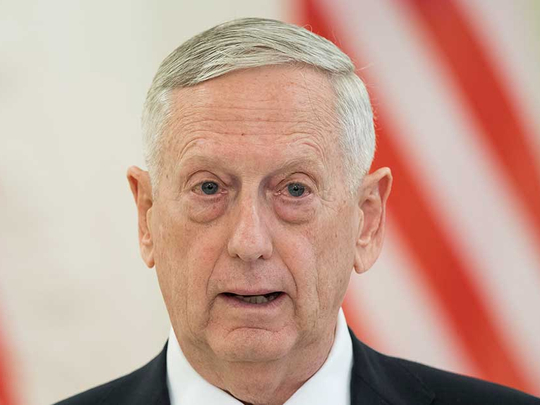
Moscow: US officials have warned any group that crosses an established “de-conflict” zone where the borders of Syria, Iraq and Jordan would face the consequences a day after US-led warplanes carried out a strike against the Syrian army, in the second attack against the regime since a Homs military airbase was hit last month — a move that shocked the world.
In a statement, the US-led coalition said it had struck “pro-regime forces ... that posed a threat to US and partner forces” but on Friday, a Syrian military official clarified that the area attacked was a military position along Tanf highway in the desert.
Speaking to reporters, US Defence Secretary Jim Mattis said the US will defend its troops in case of “aggressive” steps against them.
A US official told AP that pro-government “forces must now withdraw outside of the established de-confliction zone to avert further Coalition action and remove the threat to our forces.”
He added that forces of the US-led coalition will continue to defend themselves against Daesh or any other threat to Coalition or partnered forces in the area.
The coalition said the strike came after unsuccessful “Russian attempts to dissuade Syrian pro-regime movement” as well as “a coalition aircraft show of force, and the firing of warning shots.”
The region around Tanf, where the borders of Jordan, Syria and Iraq meet, has been considered a de-conflicted zone, under an agreement between the US and Russia that went into effect earlier this month.
Russia on Friday condemned strikes by the US-led coalition against Syrian forces as “unacceptable”, state media reported, after the bombing of pro-government troops.
“Any military actions that lead to a deterioration in the situation in Syria obviously impact the political process,” deputy foreign minister Gennady Gatilov was quoted as saying by state-run RIA Novosti in Geneva.
“Such actions that were carried out against the Syrian armed forces ... this is completely unacceptable, this is a breach of Syrian sovereignty,” he said.
Russia and Iran have deployed forces to Syria to back up leader Bashar Al Assad while the US and many of its regional and Western allies have called for the strongman to leave power.
The United States in April infuriated the Kremlin by bombing a Syrian regime airbase in response to an alleged chemical attack by Damascus.
Representatives of Syria’s government and opposition High Negotiations Committee are in Switzerland for the sixth round of UN-backed peace negotiations, but there has been little sign of progress.
In the first concrete results from talks this week on ending Syria’s conflict, the United Nations said the warring sides had agreed to set up expert committees to discuss “constitutional issues.”
Another deputy foreign minister, Mikhail Bogdanov, told TASS news agency that Russia “supports” the move.
This “flagrant aggression launched by the International coalition exposes the falsity of its allegation about fighting terrorism and undoubtedly demonstrates the reality of the Zionist-American project in the region,” an unnamed Syrian military official said.
The Syrian government has vowed to reach the border area with Iraq, a step that is likely to be opposed by the United States and its allies who back rebels fighting Daesh in the same area. A road between Iraq and Syria would facilitate the flow of assistance from Iran that is a strong backer of Al Assad.












